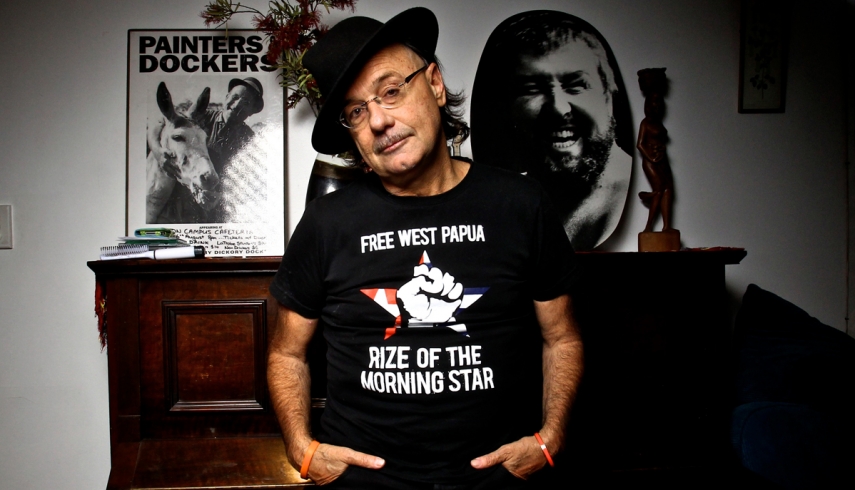Veteran punk rocker, leading music journalist and social welfare worker Paul Stewart has always lived life to the fullest.
IT was supposed to be their only gig. A hits and giggles ‘benefit’ to pay off a friend’s parking fine. They had called themselves Painters and Dockers, in honour of the notorious union which called the Port Melbourne pub they were playing at home.
Paul Stewart was meant to play trumpet on one song but was somehow roped into taking the reins as lead singer. The ear-splitting music filled the room to the brim. And then it all went pear-shaped.
‘‘The neighbour hated us so much he jumped the fence’’ – Stewart stops mid-sentence to assure me of the veracity of his anecdote – “with an axe and chopped up the mixing desk because he hated the music so much.”
‘‘Someone rang the cops. The police arrived at the pub. They tried to get in. The real Painters and Dockers said no. An all-in brawl broke out between the police and Dockers.
‘‘The kids who were there to see us were screaming and going berserk. Things were flying. People were getting smashed. People were laughing hysterically. And I looked around and thought, ‘I want to do this for the rest of my life’.’’
For the Dockers, the musical kind, it was the beginning of a notable career.
‘‘That led to about 1500 gigs, seven albums, and tours of New York, Canada and New Zealand a couple of times,’’ Stewart says.
‘‘We got to support people like Midnight Oil and The Monkees and Iggy Pop and Billy Idol. It was awesome.’’
Today, Stewart, of Newport, is sitting at a table at the Brosnan Centre in Brunswick, run by Jesuit Social Services, where he works as a project officer.
The long dark hair of his youth is sprinkled with salt and pepper, but the cheeky grin and optimism remains.
Social welfare is a far cry from his heady days as a punk rocker, but it’s a role which he seems to enjoy as much, if not more.
It’s hard to know where to begin when chatting to Stewart about his decorated life, which has also included working as a journalist at the Herald Sun for 30 years and ongoing community work in East Timor.
The 52-year-old grew up in St Kilda and wasn’t particularly into music until he went to RMIT university.
His first girlfriend was an alternative lass with blue hair and he followed her along to see bands. It was there at gigs that he met the quintet of lads who would become Painters and Dockers, an irreverent punk rock band formed in the early ’80s and known for such hits as Nude School and Die Yuppie Die.
Stewart describes the band, which was inducted into the EG Hall of Fame in 2009, as ‘‘unique’’ and ‘‘individual’’, neither champions of the underground nor the mainstream.
‘‘We weren’t part of any scene really. We took the piss out of everybody and had lots of fun.’’
They were signed to Mushroom Records and Nude School was perhaps their biggest hit. The video clip was shot at a pig farm with band members naked and their bits covered up by pigs’ feet.
Stewart says the band ‘‘lucked in’’ with MTV launching in Australia around the same time on a Friday night.
‘‘For the first three weeks the first song they played was Nude School by the Painters and Dockers because the clip was so wacky.
‘‘It ended up being an albatross because it was so popular and people wanted more stuff like that, novelty songs.’’
Journalism and Stewart’s eternal link with East Timor and helping its people will always be intertwined. He started off as a copy boy at the Sun News-Pictorial in 1979. For the first few years he wrote about the price of granny smith apples and was then placed on the horse racing round.
At one stage he sat between fellow cadets Mark Trevorrow, now a comedian best known for his flamboyant alter ego Bob Down, and (now comedian) Wendy Harmer.
It took him almost a decade to be promoted to the role of music journalist.
Looking back, Stewart is under no illusions about his foot in the door. He says he never would have landed the job if it hadn’t been for ‘‘Balibo’’.
‘‘I can remember I went into the job interview and the guy wasn’t even listening to me. And he’s like, ‘Why do you want to be a journo?’. And I was like, ‘Because my brother was one’. And he said, ‘Who was your brother?’ and I said, ‘Oh, well, he was Tony Stewart, one of the guys killed up in East Timor’. And he went, ‘Shit’!’’
Stewart was a teenager when his brother was one of five journalists who were killed while reporting on activities just prior to the Indonesian invasion of East Timor in 1975.
‘‘I didn’t know where East Timor was. I had no idea. I can remember walking past the Malvern train station and there was a banner saying that five journos were missing. I ran all the way home and mum was there with my aunties bawling their eyes out. It shocked me. I can remember thinking life is really short.’’
Stewart was close to his older brother and the tragedy has never left him, partly due to his own grief and more so because of people’s ceaseless interest.
The Dockers gave him a chance to rebel.
‘‘That’s why punk rock was such a great outlet because I got to scream and go berserk and people paid me.’’
Stewart ‘‘lucked in’’ at the Sun when a former editor decided to revamp the newspaper by including a music section and chose Stewart, who was sporting pink hair at the time and was well and truly entrenched in the Dockers, as its writer and columnist. Some of his more notable stories along the way included interviews with Keith Richards and Stevie Wonder.
‘‘It was like hand in glove.” Stewart recalls. “I got heaps of great stories.”
‘‘Guys in bands would talk to me and tell me stuff off the record that was interesting.’’
Stewart continued his double life as a journo/punk rocker with much success. He says journos of the day were just as bad as musicians, recalling colleagues writing while guzzling long-neck bottles of beer and sucking fags. ‘‘But their copy was always pristine.’’
Stewart took three years off in the mid-’80s to perform with the Dockers full-time, playing 250 gigs a year in towns across the country.
‘‘It was sort of the golden age of pub rock in Australia. There were big beer barns and people would go and see Australian bands.’’
By 1997, he says, the Dockers had run their course. He went on to form the Dili Allstars, a reggae and soul outfit which included some blokes from the Dockers and some musicians from East Timor.
“It’s good for old blokes now,” says Stewart, who believes being a Docker worked better when he was young and had a healthy liver.
Which brings us around to Stewart’s story of survival and his own brush with death.
It’s one you feel he’s told a million times. In 2007, he underwent a liver transplant, no doubt triggered by a life of excess and years of heavy drinking, but not before he well and truly thought his time was up.
Stewart was on a waiting list for a liver transplant for 18 months and had almost given up hope.
‘‘Oh, look, the priest came and did the last rights. I honestly thought my days were numbered.’’ He tells a story about a nun who came to visit him on his death bed at the Austin Hospital, a woman he got talking to. He discovered she was from East Timor, a coincidence that made him laugh at the time.
He explained his connection with the country and spoke of the Dili Allstars, whom the nun knew of courtesy of the band raising money that went to donating food to her village.
The pair continued chatting and the nun promised to find Stewart a liver through prayer, but only if he agreed to help out the kids in Timor in return. Two days later a donor arrived out of the blue.
‘‘People know me and they go, ‘Paulie, you’re full of shit, mate. That is just a coincidence’. And I say to them, ‘You weren’t there dying in that bed and you don’t know what it was like’. For me it was a miracle.’’
Stewart still sees it as a life-changing moment.
‘‘Mate it’s all been dreamtime since then. It’s all extra time for me. This is time I shouldn’t have had.’’
Another band came out of it, too: The Transplants, all of whose members have undergone a liver transplant.
Derryn Hinch even came on board to sing.
‘‘Somebody said, ‘Can he sing?’ And I said, ‘Does it matter?’.’’
Stewart kept his end of the bargain, forming an ongoing link to help out disadvantaged children in East Timor.
In 2009, he organised an appeal to buy the nuns a van to get around. His friends The Wiggles donated thousands of pairs of Dorothy the Dinosaur boots for him to take over.
Late last year he visited the country for the 13th time, his present project is to build a school for the children. It’s three-quarters of the way done.
‘‘Every time I go up there it’s like this is the last time and then some little Timorese person will give you a smile and it gets you back in.
‘‘I’m in a lucky position. Because of my brother and the Dockers, I can draw attention to East Timor.
‘‘And the other day it sort of hit me and I thought, hang on. In the ’80s it was sex, drugs and rock ‘n’roll. Now I’m hanging out with nuns. What has happened?’’








